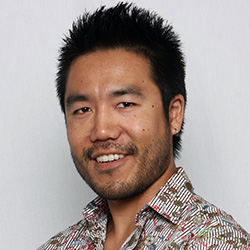
Dr. Masatoshi Sato |
Anaheim University welcomes new faculty member, Dr. Masatoshi Sato. Dr. Sato earned his Ph.D. in Educational Studies: Language Acquisition and a Master of Arts in Second Language Education from McGill University, as well as a Graduate Certificate in TESOL from the University of New Mexico and a Bachelor of Arts in International and Intercultural Communication from Kobe University. Dr. Sato is currently an Associate Professor in TESOL at Anaheim University. He has also published various international journals and recently co-edited books from John Benjamins. We recently interviewed Dr. Sato to discuss online education and his thoughts on the field of TESOL.
Q. What are your specialties?
- I’m generally interested in how SLA research could help teachers teach second language, no matter what the second language is. I have done research on peer interactions and professional development in teacher education. My primary area of research is peer instruction and how this facilitate second language learning. This research is relevant to the overall category, which is called instructed second language acquisition.
Q. What do you enjoy most about teaching at Anaheim University so far?
- I enjoyed the diversity of students, who come from different backgrounds, have different teachings, and professional experiences. The interaction I had with this diverse group of students was incredibly interesting.
Q. What do you think are the strengths of the online Ed.D. in TESOL program at Anaheim University?
- Anaheim University recruits students from anywhere in the world and this puts the online program ahead. This is because of the diverse selection of students, in terms of their backgrounds, which does not happen in traditional TESOL programs, where students are often from similar backgrounds.
Q. What are the benefits of online education?
- The flexibility that online education offers is astounding. The online education program at Anaheim University is able to be divided into two parts, synchronous and asynchronous. For the asynchronous part, students have flexibility in terms of completing assignments, participating in their respective classes and being up-to-date on viewing recorded lectures. With the synchronous aspect, students are able to have access to their resources for the course anywhere.
Q. What are the benefits of learning TESOL for English teachers?
- One issue a lot of English teachers tend to have is not having theoretical underpinnings or research backup for their pedagogical decisions when they choose certain teaching methods. In order for teachers to make more important pedagogical decisions, it is necessary to know or learn SLA theories and research findings to transfer to second language education.
Q. In your opinion, what does the future of online education look like?
- Online education has been around for a long time, but it is getting more popular. I do think as online education becomes more common, there will be some backlash that comes with it.
Q. Who would you recommend the Ed.D. program at Anaheim University to?
- I would recommend the program for students who have some knowledge of second language learning and teaching. It appears to me that students do not have a deep understanding of theoretical or research issues to become a doctorate student, but in general, I would definitely recommend the program for those who have teaching experience with a certain amount of knowledge related to second language learning and teaching.
Q. What advice would you give to someone who is aiming to be a scholar in the field?
- If someone were to become a scholar, that individual should have the mentality to contribute to society. They should learn how to solve real-world issues instead of answering theoretical questions only. Another important note to keep in mind is that, in the current research world, publication is everything. So, in order for someone to become a successful scholar, they should be able to conduct solid research and write well.
Q. What do you think are the challenges that English teachers in Japan are facing?
- It really depends on what “English teachers” means in this question. The struggle is that a lot of English teachers in Japan teach English in their native language. Nowadays, the Government is asking English to be taught in English, not in their native language, which perceives to be an issue for some teachers to make fundamental changes. But I do think this is a good change. I believe that English should be taught in English. I also want to bring attention to the issue of English teachers invited to Japan to teach English but are not qualified. Their academic content knowledge of second language teaching is not asked for. Therefore, a challenge for the future is the training of those teachers so they become more capable teachers in Japan.
Q. What advice would you give to new language teachers?
- Try to finish the necessary research in a limited amount of time, be creative, keep in mind why you decided to use certain teaching methods or activities, and make adjustments all the time. Always know the student’s individual differences and create a non-threatening collaborative classroom environment. Promote the student’s language production, let the students be aware that making errors in second language is a good thing. Lastly, always let students express their opinions, which are definitely interesting.
